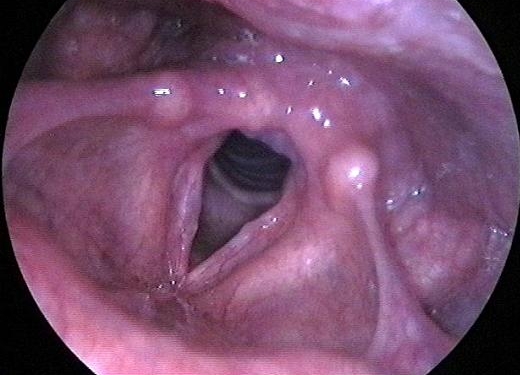Laryngitis Symptoms, Causes, Diagnosis and Treatment

What Is Laryngitis?
The medical condition is marked by the inflammation of the larynx that is the voice box. Inflammation may occur due to infection, irritation or overuse.
Larynx consists of two vocal cords that are the mucous membrane folds. These vocal cords cover the cartilage and muscle. Smoothly, they open and close, generating sounds by means of their vibration and movement. However in laryngitis, the vocal cords get irritated or inflamed. This causes them to swell.
The swelling sources sound distortion that is created by the air passing above them. Consequently, the voice tends to sound hoarse.
In addition to this, laryngitis can be chronic, that is long lasting, or it can be acute, that is short-lived. Majority instances of laryngitis are caused by vocal strain or viral infection thus is not serious. However persistent hoarseness may indicate towards a dangerous underlying condition.
What Are The Symptoms Of Laryngitis?
Few common symptoms of laryngitis include:
- Hoarseness.
- Fever.
- Difficulty breathing and swallowing.
- Swollen glands in your neck or lymph nodes.
When Is The High Time To Seek Medical Assistance?
In case hoarseness persists for more than a week or two, call up for an appointment with your doctor.
What Causes Laryngitis?
Usually, laryngitis is rooted by a viral infection, for example flu or cold viruses. However, it can also be trigger by the following factors;
- Pneumonia.
- Chemicals and irritants.
- Injury.
- Gastroesophageal reflux disease, commonly known as GERD.
- Bronchitis.
- Bacterial infection.
- Allergies.
Usually the condition arises with an upper respiratory infection. There are few types of laryngitis that affect children. Furthermore, they can proceed to serious or life-threatening respiratory blockage.
What Are The Possible Complications Of Laryngitis?
Rarely, acute respiratory distress arises, which needs prompt medical assistance.
How Is Laryngitis Diagnosed?
Usually, no specific tests are needed for its diagnosis, as a physical exam is sufficient enough to determine whether a respiratory tract infection has sourced hoarseness.
However patients with persistent hoarseness will need to consult an otolaryngologist.
How Is Laryngitis Treated?
- Usually, acute laryngitis that is sourced by a virus improves itself within a time span of 8 to 10 days. Moreover, self-care measures are also effective in easing its symptoms.
- The treatment of chronic laryngitis focuses to treat the underlying triggers for example excessive consumption of alcohol, smoking or heartburn.
Medications that can be prescribed in rare instances are:
1. Antibiotics.
2. Corticosteroids.
What Is The Prognosis Of Laryngitis?
Usually, laryngitis that is triggered by a viral infection tends to improve itself, with self-care measures. Instances rooted by some serious medical condition would indeed need time and treatment to ease the symptoms.
How Is Laryngitis Preventable?
Yes, to some extent. Try out the following:
- During flu and cold season, avoid having direct contact with individuals with upper respiratory infections.
- Wash your hands more frequently.
- Quick smoking, this will help avert tumors of the lungs, neck or head that can proceed to hoarseness.
- Avoid straining your voice.
By : Natural Health News




